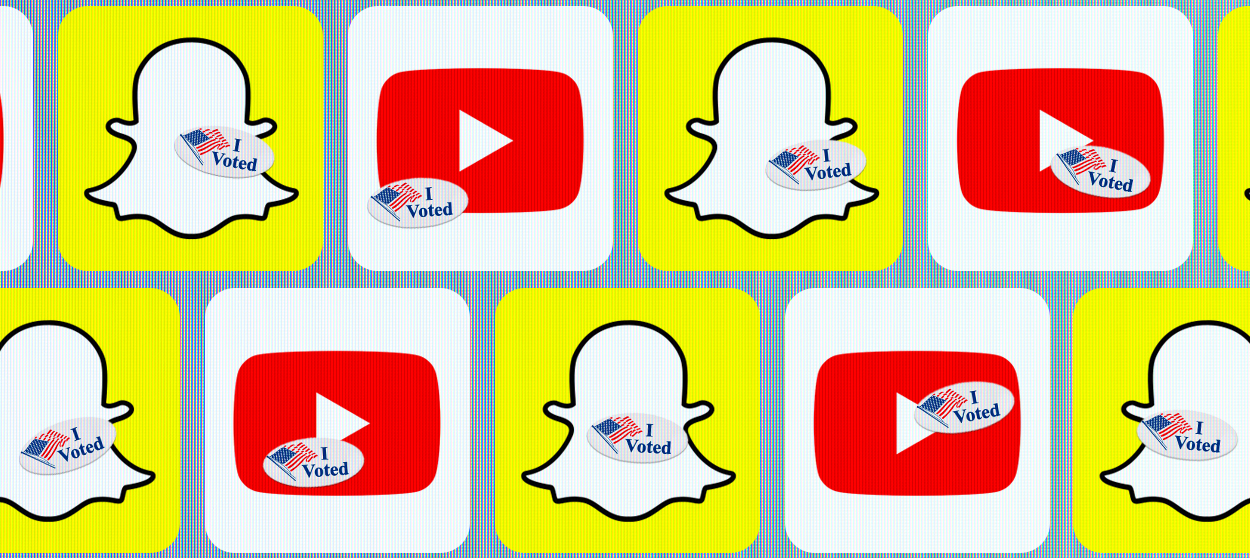How YouTube and Snapchat could control the youth vote
Move over, Facebook and Twitter. Tomorrow's youngest constituents are looking elsewhere for their political news.


A free daily email with the biggest news stories of the day – and the best features from TheWeek.com
You are now subscribed
Your newsletter sign-up was successful
The role social media and technology play in modern elections can't be overstated. This is particularly true for young voters, more than a third of whom told Pew in early 2016 that social media was the source they found "most helpful" for learning about the presidential election. Not cable news. Not candidates' campaigns. Social media — like Facebook and Twitter.
But the young people who will be voting in future elections — many of whom will be casting their ballots for the first time — don't really use Facebook or Twitter anymore. Where Facebook dominated social networking for teenagers in the recent past, now only 15 percent of teenagers say Facebook is their social network of choice. Indeed, young peoples' interests change quickly, and with two years still remaining until the next presidential race, the question pollsters and politicians alike should be asking themselves is this: How will technology influence the way young people vote in the years to come?
It is not an exaggeration to say that the youth vote could sway the next election. "In the 2016 presidential election, Gen X and younger generations were a majority of voters," a Pew survey found. "Since 2014, the number of voting-eligible Gen Xers, millennials, and post-millennials has increased by 18 million." Most of this influx comes in the form of teenagers who achieved voting age.
The Week
Escape your echo chamber. Get the facts behind the news, plus analysis from multiple perspectives.

Sign up for The Week's Free Newsletters
From our morning news briefing to a weekly Good News Newsletter, get the best of The Week delivered directly to your inbox.
From our morning news briefing to a weekly Good News Newsletter, get the best of The Week delivered directly to your inbox.
Capturing the youth vote could be key for any successful candidate. And social media is a really good way to do it. According to a study by the AP-NORC Center for Public Affairs Research, social media appears to galvanize young people to action. Teens who use Twitter are more likely to take part in a protest and express political beliefs. Instagram users are more likely to protest, post about politics, raise money for a cause, and volunteer. And teens who use six (yes, six!) or more social media platforms are more likely to protest, sign a petition, and talk about political beliefs than those who use fewer.
These are engaged constituents, and many of them are eager to do their civic duty. Right now, even the not-yet-18 crowd is gearing up to exercise their voting rights: California Secretary of State Alex Padilla told CNN that almost 90,000 16- and 17-year-olds have pre-registered to vote in the state since 2016, thanks to a new law that allows them to register early.
But just because these people can vote doesn't mean they actually will. The Center for Information & Research on Civic Learning And Engagement (CIRCLE) found that in 2016 nearly 6 million young people between the ages of 18 and 29 were "undermobilized," meaning they registered but failed to make it to the polls. For some, this came down to not liking either of the candidates. But for many others, it was a matter of not having the time or the transportation to get to the polling place. In coming years, technology might play a larger role in mobilizing these voters than in actually swaying their political views.
Rock the Vote is trying to do this with its online tools, mainly its registration page and polling-place-lookup tool. When voters are entered into the online system, they get reminders about voting. "That system uses your address to send customized election reminders and online resources directly to your phone," the nonprofit's president and executive director Carolyn DeWitt explains. "We have seen this system increase voter turnout by as much as 30 points over the national average."
A free daily email with the biggest news stories of the day – and the best features from TheWeek.com
As for social media, a Pew survey finds that three platforms — YouTube, Instagram, and Snapchat — are the tools of choice for younger demographics. Recently, Snapchat unveiled a tool that helps anyone of voting age register to vote — and get their friends to vote — right through the app. "The platforms serve different purposes and teenagers have different ways of using each of them," DeWitt explains. "And peer-to-peer influence is huge with this age group."
News organizations are already utilizing Snapchat's popularity to amplify coverage. "All the major news outlets have channels on Snapchat," says Caroline Knorr, parenting editor at nonprofit Common Sense Media. "They run the same news stories but in bite-sized, interactive ways. ... There are a lot of people on YouTube curating news into memes, which are wildly popular. I'll bet every teenager alive has watched the mashup of Kavanaugh and Sam Jackson." (For anyone curious, here's that video, but be warned there is some NSFW language):
In fact, YouTube might well be the sleeper technology to watch in upcoming elections. According to a recent Pew survey, 85 percent of American teens use YouTube. "A lot of teens can't vote yet," says Knorr. "But they love YouTube. It is, to some extent, overlooked as a social media platform. But it is one of the chief places teens get news."
What about "fake news"? Will tomorrow's youngest voters be targeted by a wave of dubious news stories on their social media network of choice? Actually, it seems the fake news fiasco of the 2016 elections — in which fake stories infiltrated social media with devastating effects — has made these voters more scrupulous with their news habits. They've become fact-checking machines. A poll from Common Sense Media found that only one in four people between the ages of 10 and 18 put "a lot" of trust in the information they receive from news organizations. "They understand that every story has a perspective," says Knorr. "This is great. That is one of the key messages we try to teach in media literacy training."
Whatever their online platform of choice, make no mistake, young people today are very plugged in to the political landscape. "Absolutely they are informed," says Rock the Vote's DeWitt. "They are passionate about the issues. You can find evidence of that in the marches they attend and in their life experience, from Black Lives Matter to gun violence in schools."
Will that passion motivate them to flood the polls for one party in particular? We'll have to wait and see.
Christina Wood has been a working writer for over a decade. She has covered technology, education, parenting, travel, and many other subjects for Family Circle, Better Homes and Gardens, Popular Science, CIO, This Old House Magazine Yahoo!, PC World, PC Magazine, USA Weekend, and many properties that are no longer in print. Her novel, Vice Report, is available on Amazon.
-
 The ‘ravenous’ demand for Cornish minerals
The ‘ravenous’ demand for Cornish mineralsUnder the Radar Growing need for critical minerals to power tech has intensified ‘appetite’ for lithium, which could be a ‘huge boon’ for local economy
-
 Why are election experts taking Trump’s midterm threats seriously?
Why are election experts taking Trump’s midterm threats seriously?IN THE SPOTLIGHT As the president muses about polling place deployments and a centralized electoral system aimed at one-party control, lawmakers are taking this administration at its word
-
 ‘Restaurateurs have become millionaires’
‘Restaurateurs have become millionaires’Instant Opinion Opinion, comment and editorials of the day
-
 The billionaires’ wealth tax: a catastrophe for California?
The billionaires’ wealth tax: a catastrophe for California?Talking Point Peter Thiel and Larry Page preparing to change state residency
-
 Bari Weiss’ ‘60 Minutes’ scandal is about more than one report
Bari Weiss’ ‘60 Minutes’ scandal is about more than one reportIN THE SPOTLIGHT By blocking an approved segment on a controversial prison holding US deportees in El Salvador, the editor-in-chief of CBS News has become the main story
-
 Has Zohran Mamdani shown the Democrats how to win again?
Has Zohran Mamdani shown the Democrats how to win again?Today’s Big Question New York City mayoral election touted as victory for left-wing populists but moderate centrist wins elsewhere present more complex path for Democratic Party
-
 Millions turn out for anti-Trump ‘No Kings’ rallies
Millions turn out for anti-Trump ‘No Kings’ ralliesSpeed Read An estimated 7 million people participated, 2 million more than at the first ‘No Kings’ protest in June
-
 Ghislaine Maxwell: angling for a Trump pardon
Ghislaine Maxwell: angling for a Trump pardonTalking Point Convicted sex trafficker's testimony could shed new light on president's links to Jeffrey Epstein
-
 The last words and final moments of 40 presidents
The last words and final moments of 40 presidentsThe Explainer Some are eloquent quotes worthy of the holders of the highest office in the nation, and others... aren't
-
 The JFK files: the truth at last?
The JFK files: the truth at last?In The Spotlight More than 64,000 previously classified documents relating the 1963 assassination of John F. Kennedy have been released by the Trump administration
-
 'Seriously, not literally': how should the world take Donald Trump?
'Seriously, not literally': how should the world take Donald Trump?Today's big question White House rhetoric and reality look likely to become increasingly blurred
